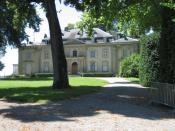Francois Marie Arouet (Voltaire)
Francois Marie Arouet (Voltaire) was born on November 21, 1694. He was not expected to live through childhood because he was always very sick. His father was a lawyer and believed that if his son survived that he should study law. He did survive and his father sent him to the Jesuit College of Louis-Le-Grande. At the Jesuit College he excelled in his academics and was highly commended for his studies. At this college he developed his ability to write that would forever affect his life. (http://www.ericjones.com/features/candide/voltaire/default.asp)
Voltaire started moving towards the aristocratic circles and writing. This was unacceptable to his father, fearing that his son was becoming more liberal and neglecting his law studies, he forced him to move from Paris to Holland. At Holland, Voltaire fell in love with a Protestant woman, but Voltaire's father was against her religion and forced Voltaire to return home in 1713.
(http://www.ericjones.com/features/candide/voltaire/default.asp)
He was becoming known as a writer of satire and prose. So in 1716, when two offensive works Puerto Regnanto and J'ai vu appeared, he was accused of being the author and was sentenced to prison for 11 months. Voltaire completed his play Edipe while he was in prison and began to write L'Hernriade. Around this time, he took up the name of Voltaire. (http://www.ericjones.com/features/candide/voltaire/default.asp)
In 1726, Voltaire insulted a powerful young nobleman, Chevalie De Rohan, and challenged him to a duel. Chevalier had Voltaire imprisoned for two weeks in the Bastille. When he was released he was given two options of punishment, continued imprisonment or exile. He chose to be exiled to Enlgand. (http://www.ericjones.com/features/candide/voltaire/default.asp)
From 1726 to 1729 spent his time in England. He found himself liking the new philosophies of John Locke and the ideas of the mathematician and scientist, Sir Isaac Newton. Voltaire studied England's Constitutional Monarchy and its religious tolerances. After he returned to Paris, he wrote a book glorify English customs and institutions. The book was taken as insulting French government and Voltaire was forced to leave Paris again. (http://www2.lucidcafe.com/lucidcafe/library/95nov/voltaire.html)
In 1759, Voltaire purchased an estate called Ferney near the French-Swiss border where he lived just until before his death. Voltaire worked continuously throughout the years producing a constant flow of books, plays and other publications. He wrote hundreds of letters to his circle of friends. In 1763, he wrote his Treatise on Toleration, which was a reminder that all men are brothers under God. Voltaire's works and strong efforts promoted deism, a system of thought that denies the interference of the Creator with laws of the universe. (http://www2.lucidcafe.com/lucidcafe/library/95nov/voltaire.html)
Voltaire returned to Paris at the age of 83. The excitement of the trip was too overwhelming for him and he died. His criticism of the church denied Voltaire church burial ground. He was finally buried at an abbey in Champagne. In 1791, his remains were moved to a resting place at the Pantheon in Paris. (http://www.ericjones.com/features/candide/voltaire/default.asp)
Voltaire left a big impact in society. He questions and philosophies challenged great figures of the time. His writings we leave him unforgotten.
Bibliography
"Francois Marie Arouet de Voltaire."
http://www.ericjones.com/features/candide/voltaire/default.asp
"Voltaire."
http://www2.lucidcafe.com/lucidcafe/library/95nov/voltaire.html


